Introduction
In a data-driven world, machine learning (ML) is transforming industries and redefining the way organizations operate.
A recent report from McKinsey highlights that companies leveraging AI and machine learning can increase their cash flow by 122% over the next five years, showcasing the immense potential of these technologies.
However, the journey from data to actionable insights is not always straightforward. This is where ML Model Engineering Services come into play, acting as the backbone for successful machine learning implementations.
Picture a bustling hospital where AI algorithms analyze thousands of medical images in real-time to detect early signs of diseases, saving countless lives. Or imagine a financial institution employing advanced machine learning models to detect fraud within seconds, protecting both businesses and consumers.
These scenarios exemplify the power of ML Model Engineering Services, which not only streamline processes but also pave the way for innovation and efficiency across various sectors. This blog will guide you in implementing ML Model Engineering Services.
Understanding the ML Model Engineering Lifecycle
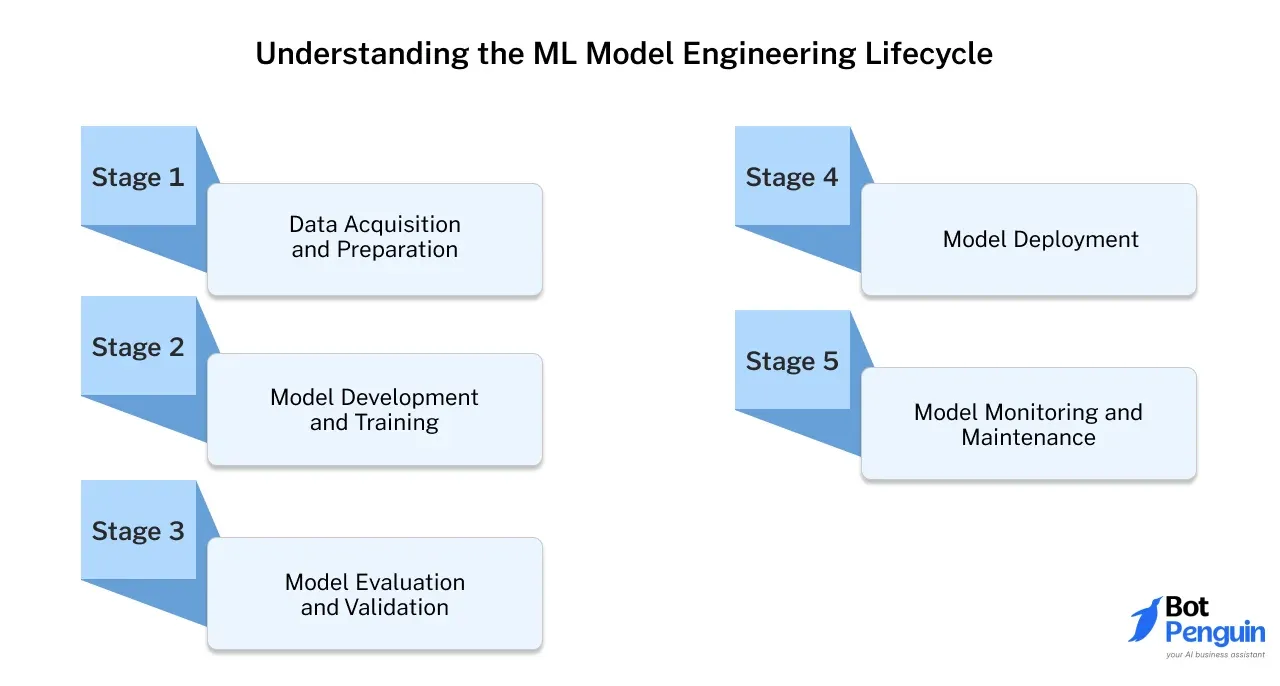
To successfully implement ML Model Engineering Services, it’s essential to grasp the entire lifecycle of a machine learning project.
Each phase, from data acquisition to deployment and monitoring, plays a crucial role in shaping the effectiveness of the model.
A solid understanding of these steps helps avoid common pitfalls and ensures that the model operates optimally, delivering real-world results. Let’s explore the essential stages of the ML model engineering lifecycle.
Stage 1
Data Acquisition and Preparation
The journey begins with gathering and preparing data, a fundamental aspect of ML Model Engineering Solutions.
Raw data is often messy and incomplete, necessitating meticulous data cleaning, transformation, and formatting.
This preparatory work is critical; without well-structured data, even the most advanced algorithms will struggle to perform effectively. A robust data foundation is the bedrock of any successful machine-learning model.
Stage 2
Model Development and Training
In this phase, the actual model is constructed using the prepared dataset. Selected algorithms train the model to recognize patterns and relationships within the data.
An ML Model Engineering Services & Development Company often utilizes diverse methodologies and iterative refinement during this stage to enhance model accuracy.
Continuous training and adjustment ensure that the model adapts to the intricacies of the data, maximizing its performance.
Stage 3
Model Evaluation and Validation
Once training is complete, the model undergoes evaluation and validation. This crucial process assesses how well the model is likely to perform on new, unseen data.
Metrics such as accuracy, precision, and recall are employed to gauge the model’s effectiveness.
It is vital to ensure that the model excels not just with training data but also in real-world applications, making this step indispensable in the realm of Expert ML Model Engineering Services.
Stage 4
Model Deployment
The deployment stage is where the model transitions to a live production environment.
Here, the ML Model Engineering Services team ensures seamless integration with existing systems and processes, enabling the model to inform decision-making effectively. This step is vital for translating model capabilities into actionable insights that drive business value.
Stage 5
Model Monitoring and Maintenance
After deployment, ongoing monitoring becomes essential for tracking the model’s performance. Over time, models may degrade due to changes in data patterns or shifts in the operational environment.
Regular maintenance is critical to ensuring that the model remains accurate and relevant. This proactive approach is a key component of sustained success in ML Model Engineering Services.
By continually assessing and refining the model, organizations can adapt to evolving conditions and maintain high-performance standards.
4 Key Components of ML Model Engineering Services
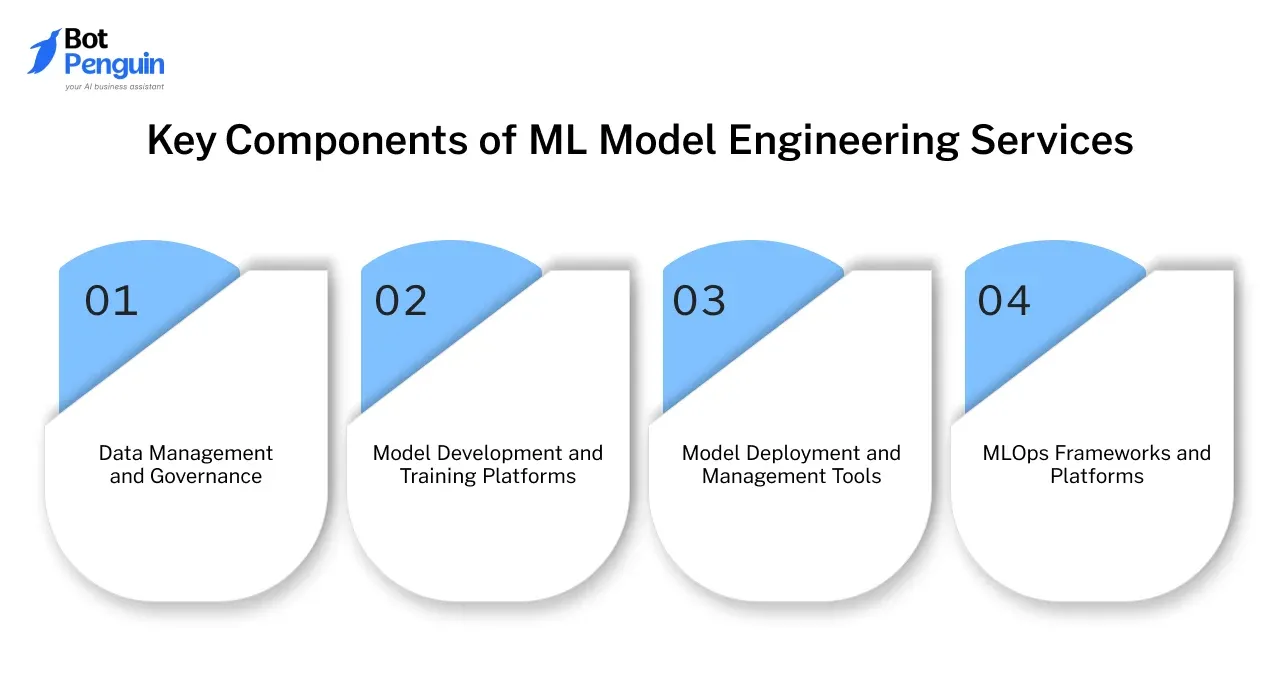
Implementing ML Model Engineering Services involves several key components that ensure seamless execution from data collection to deployment. Each of these components plays a vital role in the overall machine-learning lifecycle.
By understanding them, businesses can maximize the potential of their machine-learning models, ensuring they are well-structured, efficient, and effective. Below, we explore the primary components that define a robust ML model engineering solution.
Data Management and Governance
.webp)
Data is the backbone of any machine learning model, making data management and governance critical for effective ML Model Engineering Services. This involves collecting, cleaning, and storing data in an organized manner to ensure accuracy and consistency.
Robust governance strategies ensure that the data is not only accessible but also compliant with regulations, safeguarding its integrity.
For a successful model, your ML Model Engineering Services & Development Company must implement strong governance protocols. Without these protocols, data inconsistencies or breaches can derail the entire project and compromise the model's effectiveness.
Model Development and Training Platforms
The core of ML Model Engineering Services lies in the development and training of the machine learning model. Selecting the right platform for model training is crucial to ensure efficient model building.
Various platforms, such as TensorFlow, PyTorch, or cloud-based tools, offer features that streamline the training process. These platforms facilitate faster development, efficient handling of large datasets, and smoother collaboration among team members.
By leveraging these platforms, Expert ML Model Engineering Services providers ensure that your model can be iterated and refined easily, leading to higher accuracy and performance.
Model Deployment and Management Tools
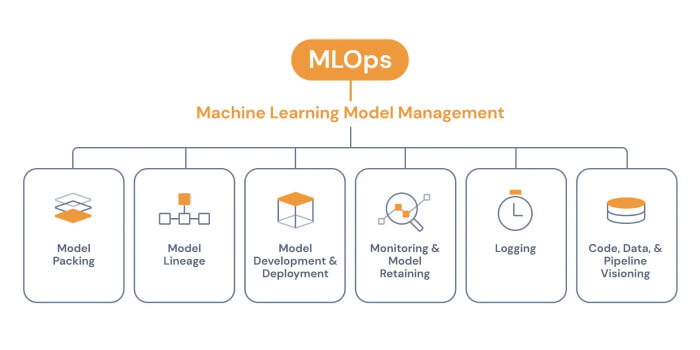
Once the model is developed, the next critical step is deployment. The tools used for model deployment are essential for integrating the machine learning model into existing systems.
These tools manage everything from version control to scaling the model’s performance as data volumes grow.
The goal of ML Model Engineering Services is to ensure that deployment happens smoothly without disrupting operations.
Effective management tools also monitor the model post-deployment, ensuring it runs optimally and flags any performance issues for quick resolution.
With the right deployment and management tools, your model can be scaled to handle increasing data loads or new operational challenges.
MLOps Frameworks and Platforms
The last, but equally important, component of ML model engineering solutions is the adoption of MLOps frameworks. MLOps combines machine learning development with IT operations, streamlining the lifecycle from development to deployment and monitoring.
These frameworks offer automation tools for continuous integration and continuous delivery (CI/CD), ensuring that models are updated regularly without manual intervention.
An ML Model Engineering Services & Development Company often adopts these platforms to provide ongoing support, maintenance, and improvements to machine learning models.
With MLOps in place, businesses can scale their machine learning efforts, ensuring long-term success and adaptability.
6 Best Practices for Implementing ML Model Engineering Services
Implementing ML Model Engineering Services effectively requires adherence to best practices that enhance model quality and ensure efficiency, scalability, and compliance with security standards.
By following these guidelines, businesses can avoid common pitfalls and maximize the benefits of their ML model engineering solutions. Below are some key best practices to consider when implementing these services.
Collaboration between Data Scientists and Engineers

A successful machine learning project relies on strong collaboration between data scientists and engineers. While data scientists focus on building models, engineers ensure that these models are seamlessly integrated into production environments.
This teamwork is critical in ML Model Engineering Services because it bridges the gap between experimentation and implementation.
An ML Model Engineering Services & Development Company often emphasizes this cross-functional collaboration to deliver well-rounded and effective solutions.
Automation and Orchestration of ML Pipelines
Automation is key to speeding up the entire lifecycle of machine learning models. Automating tasks such as data cleaning, model training, and deployment makes the process more efficient and reduces human errors.
Orchestration tools like Airflow or Kubeflow can streamline these tasks, allowing for quicker iterations and improved performance. Automation is essential for scaling Expert ML Model Engineering Services, ensuring that models can be managed efficiently at any stage.
Continuous Integration and Continuous Delivery (CI/CD) for ML
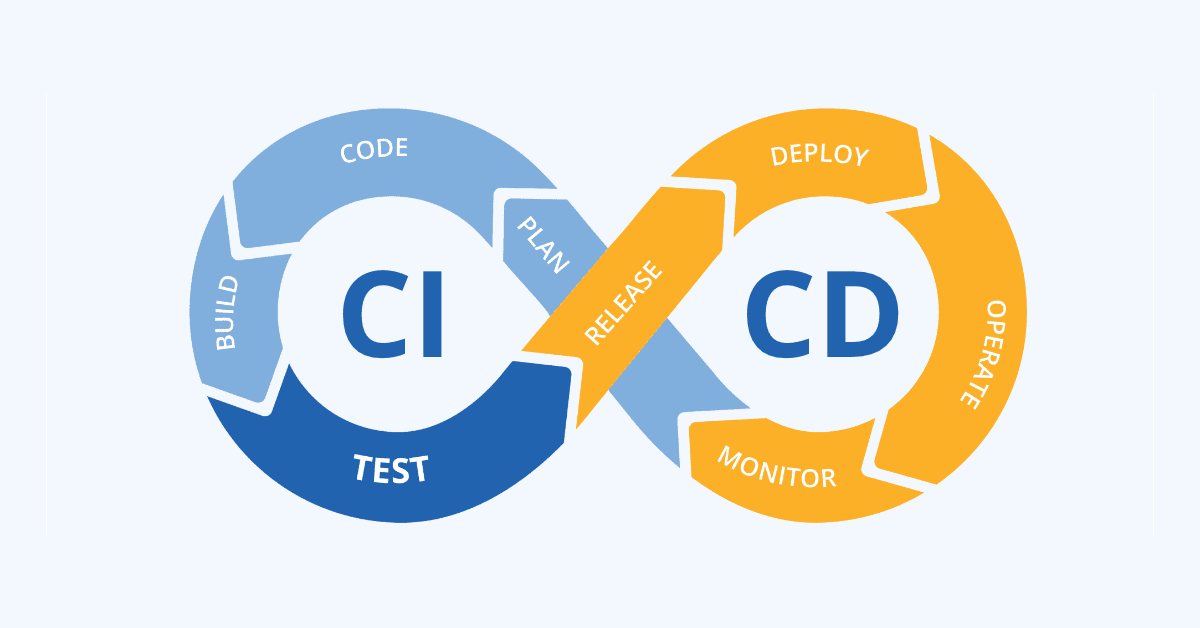
Just like software development, machine learning benefits from Continuous Integration and Continuous Delivery (CI/CD). This practice allows for automated testing and updating of models, ensuring that new changes are integrated without disrupting the production environment.
In the context of ML model engineering solutions, CI/CD guarantees that models evolve over time without requiring a complete rebuild. This not only saves time but also helps maintain high performance and accuracy levels.
Version Control and Reproducibility
Version control is crucial for tracking changes in data, code, and models. It ensures that previous versions of the model can be retrieved, tested, and deployed if needed.
Reproducibility ensures that the same results can be achieved when the model is run multiple times under the same conditions. These practices are standard in ML Model Engineering Services, making it easier for teams to track progress and resolve issues quickly.
Scalability and Performance Optimization
Scalability is a vital aspect of ML Model Engineering Services. As models are deployed in real-world environments, they must be able to handle increasing data volumes and user loads.
Performance optimization techniques, such as parallel computing or the use of more efficient algorithms, ensure that the models remain robust under stress.
A reputable ML Model Engineering Services & Development Company ensures that both scalability and performance are factored in during the engineering process.
Suggested Reading:
Top 5 Best ML Model Engineering Services in USA
Security and Privacy Considerations
Finally, security and privacy must not be overlooked in ML Model Engineering Services. Machine learning models often deal with sensitive data, making it crucial to implement strong security measures to protect this information.
Compliance with privacy regulations, such as GDPR, is essential when building and deploying models. For Expert ML Model Engineering Services, security and privacy are integral components that ensure models are both compliant and safe to use.
Case Studies: Successful Implementations of ML Model Engineering Services
In this section, we explore case studies of Expert ML Model Engineering Services that have transformed various industries through innovative applications of machine learning.
Healthcare
AI-powered ML Model Engineering Services models are crucial for early disease diagnosis and personalized treatment plans.
Drug Discovery

ML model engineering solutions are revolutionizing drug discovery by screening millions of compounds at an unprecedented speed.
For example, Atomwise employs machine learning to predict which drug formulations are most likely to succeed in treating specific diseases.
By utilizing ML Model Engineering Services, Atomwise has accelerated the drug discovery process, significantly reducing the time and cost traditionally associated with developing new pharmaceuticals.
Disease Diagnosis Using Medical Images
AI-powered models are making significant strides in analyzing medical images like X-rays and MRIs to detect diseases early.
For instance, Google's DeepMind developed a model that achieves high accuracy in diagnosing eye diseases from retinal scans.
These models, created through robust ML Model Engineering Services, demonstrate great promise in early disease detection, particularly for conditions such as cancer and heart disease.
Suggested Reading:
10 Best Tools for Fine Tuning Machine Learning Models
Personalized Medicine
Machine learning models are paving the way for personalized medicine by predicting which treatments will be most effective for individual patients.
IBM Watson for Oncology analyzes data from numerous cancer patients to recommend tailored treatment plans, enhancing patient outcomes.
These models, developed through Expert ML Model Engineering Services, ensure that care plans are individualized, improving efficacy and patient satisfaction.
Finance
ML Model Engineering Services are instrumental in enhancing security and decision-making processes within the finance sector.
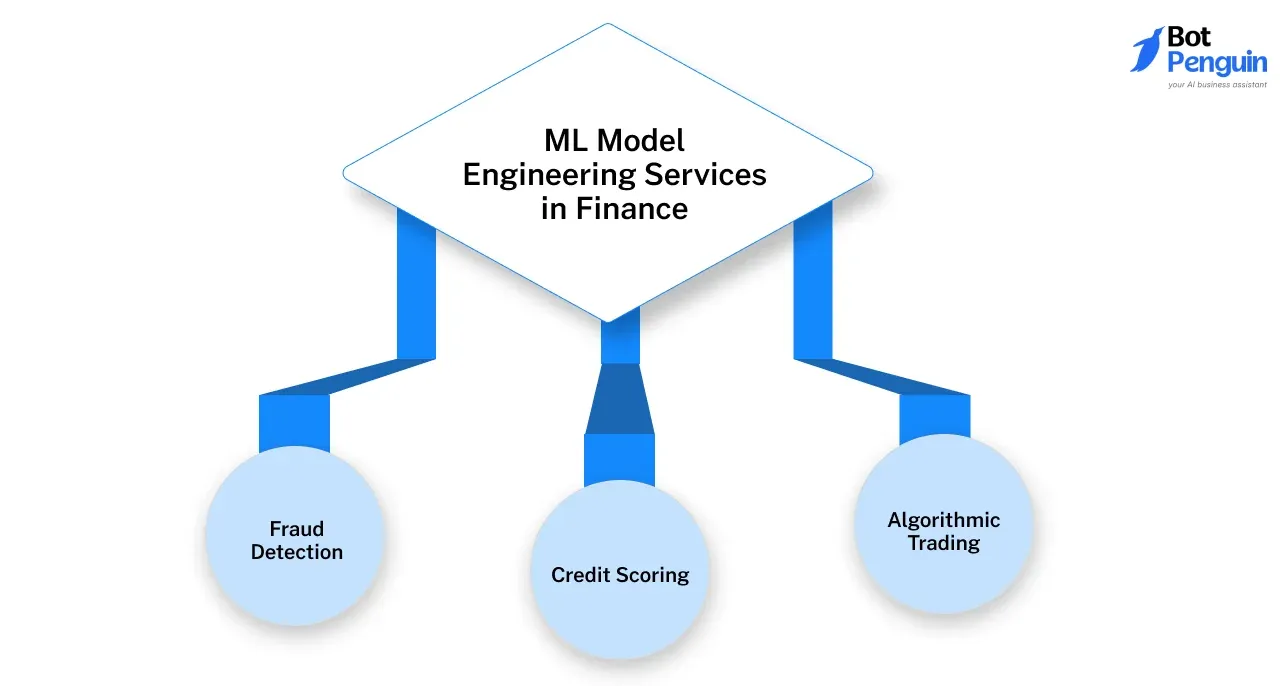
Fraud Detection
Financial institutions are increasingly using machine learning models to detect fraudulent activities in real-time.
For example, PayPal employs advanced ML algorithms to monitor transactions and identify suspicious activities, significantly reducing fraud losses.
This application of ML Model Engineering Services protects both businesses and customers from significant financial harm.
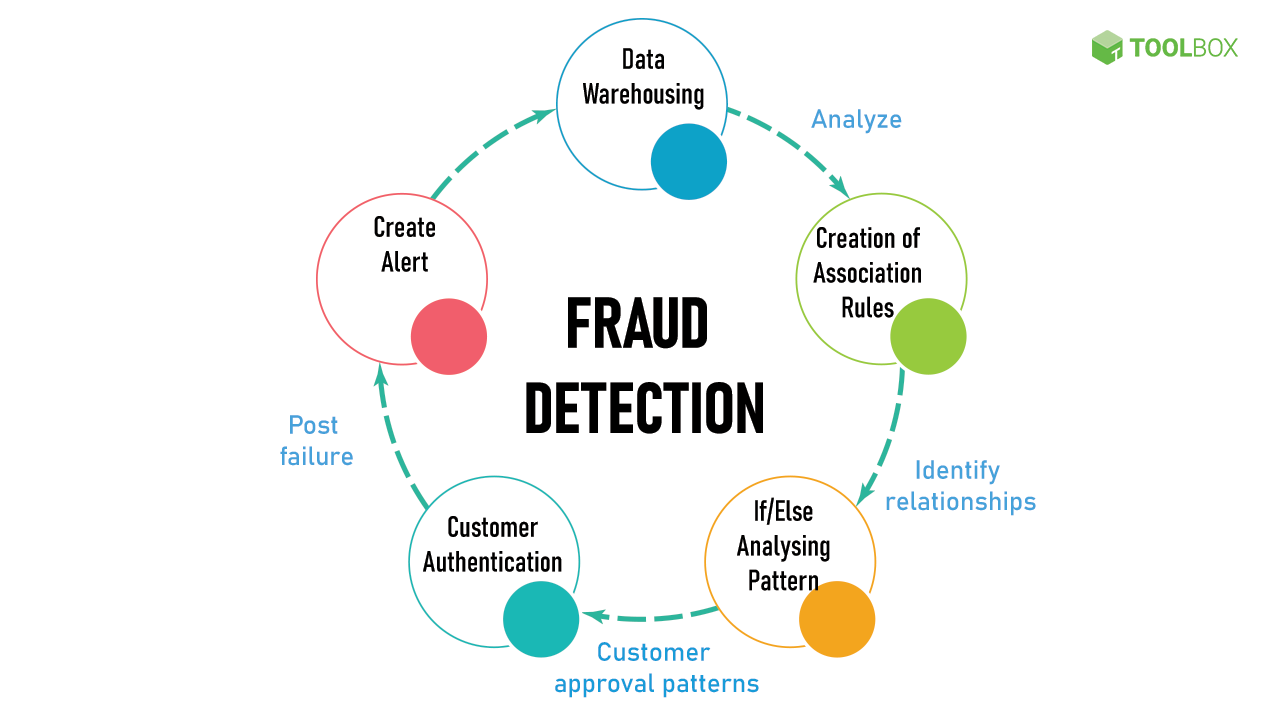
Credit Scoring
Expert ML Model Engineering Services have improved credit scoring systems by assessing a broader range of factors, leading to fairer lending decisions.
Companies like ZestFinance utilize machine learning to analyze alternative data, enabling better risk assessments and more inclusive lending practices.
Algorithmic Trading
In the finance sector, teams from ML Model Engineering Services & Development Company have developed sophisticated algorithms that automate trading based on real-time market data.
For instance, firms like Renaissance Technologies leverage these systems to optimize investments and reduce risks, illustrating how machine learning can transform trading strategies.
E-commerce
ML Model Engineering Services enhance customer experiences and drive sales in the e-commerce industry.
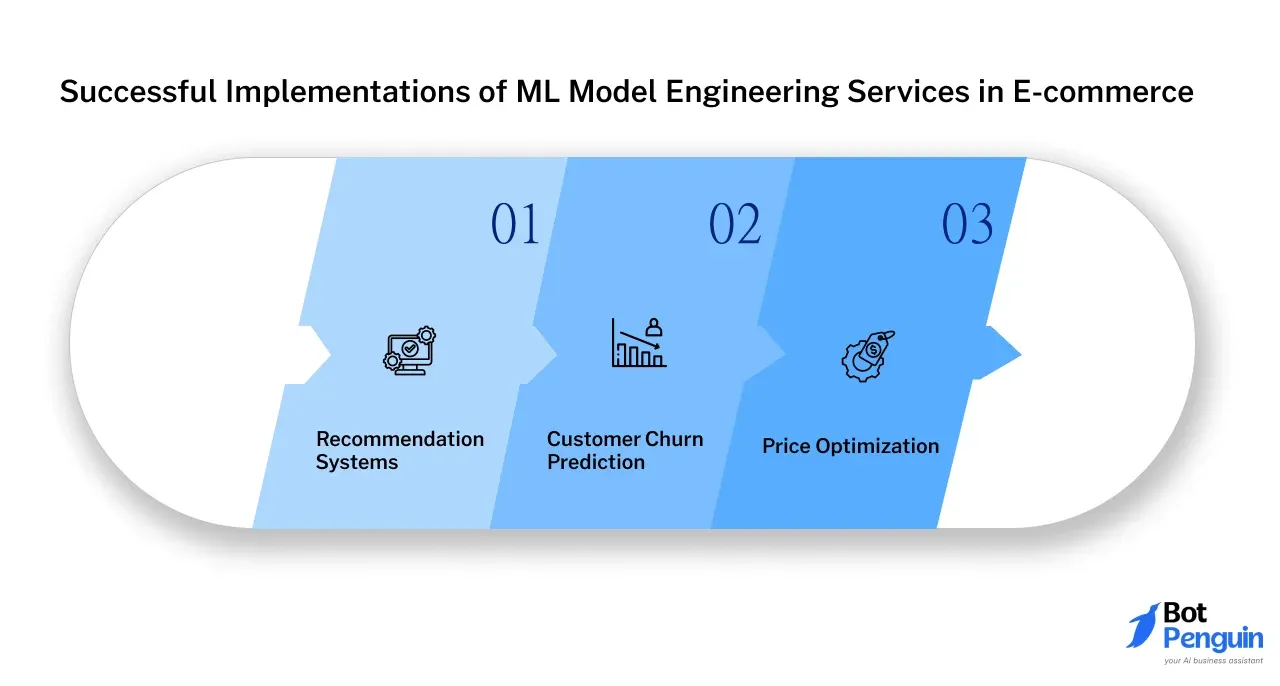
Recommendation Systems
E-commerce giants like Amazon and Netflix utilize machine learning to create personalized product recommendations, significantly boosting sales and customer satisfaction.
These recommendation systems, built on ML model engineering solutions, analyze user behavior to suggest items that are likely to resonate with individual preferences.

Customer Churn Prediction
Predictive models are invaluable for businesses in identifying customers likely to leave. For example, companies like Shopify use machine learning to analyze customer data and detect patterns indicating churn.
By implementing timely interventions, these businesses can retain customers more effectively, showcasing the power of Expert ML Model Engineering Services.
Price Optimization
Machine learning models enable real-time price adjustments based on demand, competition, and other market factors, maximizing revenue.
For instance, dynamic pricing strategies employed by companies like Uber utilize machine learning to adjust fares based on real-time supply and demand metrics, illustrating the effectiveness of ML Model Engineering Services in enhancing profitability.
Future Trends in ML Model Engineering Services
As ML Model Engineering Services continue to evolve, several emerging trends are poised to reshape how machine learning models are constructed, deployed, and maintained.
These advancements aim to simplify processes, enhance transparency, and tackle ethical concerns. Here are some key trends set to influence the future of ML model engineering solutions.
AutoML and Hyperparameter Optimization

AutoML is revolutionizing model development by automating tasks like feature selection, model selection, and hyperparameter optimization. This innovation allows even non-experts to create models with minimal coding expertise.
Increasingly, Expert ML Model Engineering Services providers are leveraging AutoML to streamline their workflows and accelerate time to deployment.
Explainable AI (XAI)
With AI playing a pivotal role in decision-making, Explainable AI (XAI) is becoming essential. XAI aids users in understanding how machine learning models derive their predictions, enhancing model transparency.
This is particularly important for ML Model Engineering Services & Development Company teams operating in sensitive sectors like healthcare and finance, where the rationale behind decisions must be clear.
Edge AI and Federated Learning
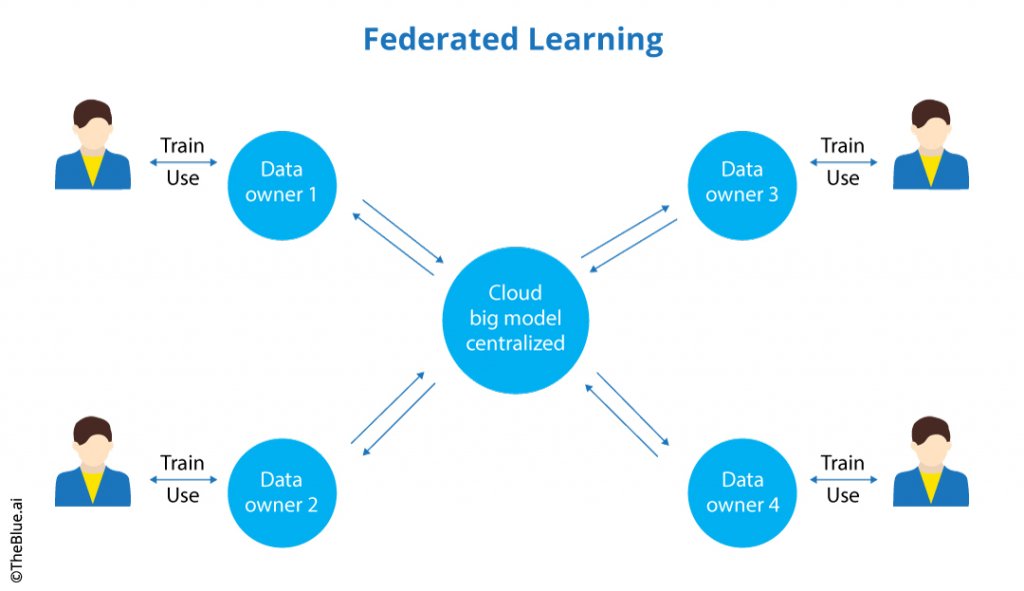
Edge AI and Federated Learning are bringing machine learning closer to data sources. Instead of relying solely on cloud computing, models can now be trained and executed on edge devices, such as smartphones.
This approach reduces latency and bolsters privacy, making it crucial for scaling ML model engineering solutions in real-time applications.
Ethical AI and Bias Mitigation
Mitigating bias in machine learning models is vital for ensuring equitable outcomes. Ethical AI practices emphasize identifying and addressing biases, ensuring that models are both accurate and fair.
For an ML Model Engineering Services & Development Company, integrating ethical considerations into the model-building process has become a top priority, especially as global regulations become more stringent.
Why Choose BotPenguin?
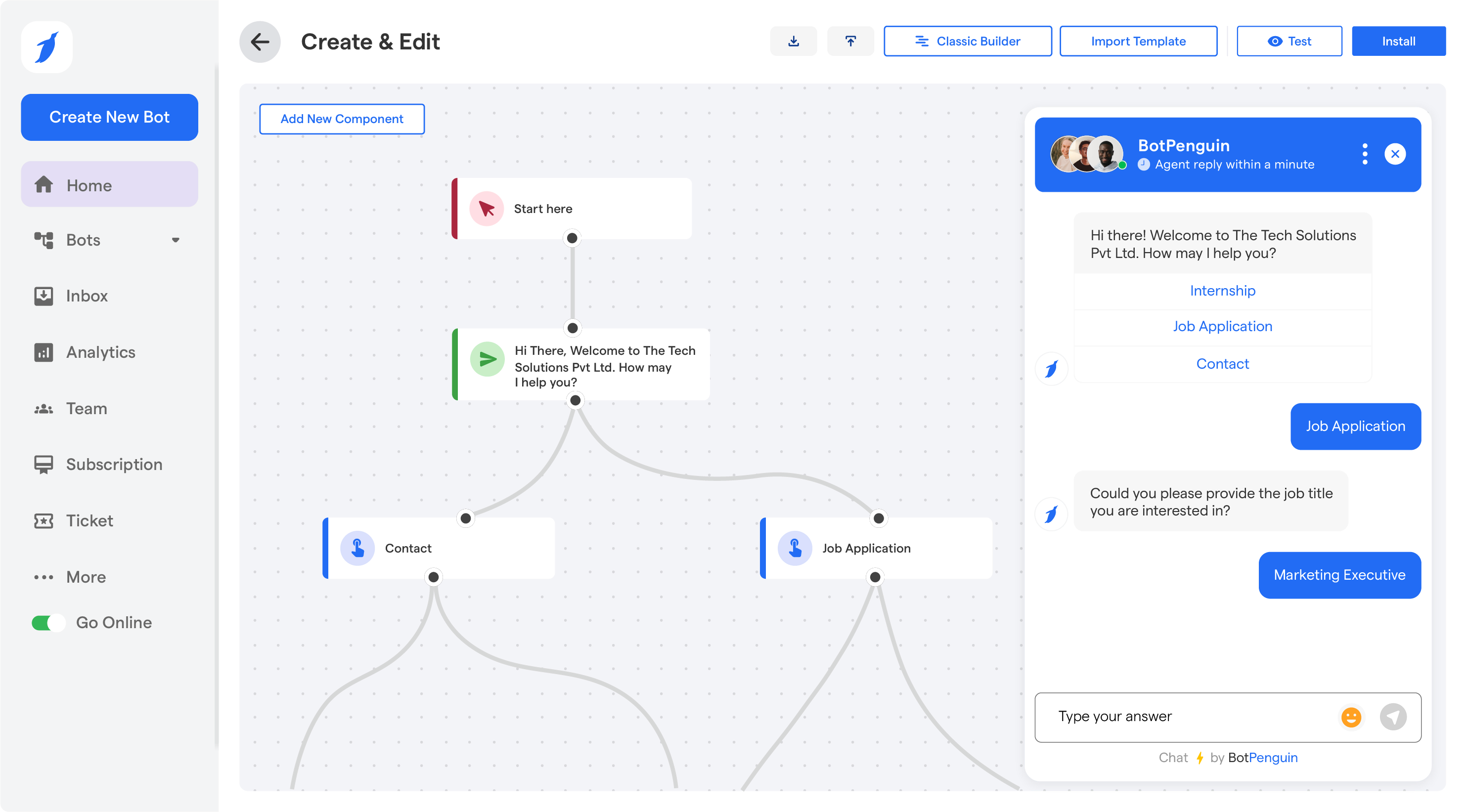
Consider BotPenguin for your ML Model Engineering Services needs. Originally known for its innovative chatbot solutions, BotPenguin has broadened its expertise to include comprehensive ML model engineering capabilities.
Their services cover everything from data preprocessing and feature engineering to model selection, hyperparameter tuning, and deployment.
What truly sets BotPenguin apart is its unique focus on integrating machine learning models with conversational AI, enabling organizations to develop smarter and more responsive chatbots and virtual assistants.
By choosing BotPenguin, you can harness the power of machine learning to enhance user interactions and drive better business outcomes.
Conclusion
In conclusion, the landscape of ML Model Engineering Services is continuously evolving, driven by advancements in automation, transparency, and ethical practices.
Embracing these trends not only enhances the efficiency and accuracy of machine learning models but also ensures their responsible use in critical sectors such as healthcare, finance, and e-commerce.
By prioritizing AutoML, Explainable AI, Edge AI, and ethical considerations, businesses can unlock the full potential of their data and make informed decisions that positively impact their operations.
For organizations looking to stay ahead in this rapidly changing environment, BotPenguin offers comprehensive ML model engineering services that integrate seamlessly with cutting-edge technology.
With a focus on innovation and reliability, BotPenguin empowers businesses to leverage the power of machine learning and conversational AI effectively.
Frequently Asked Questions (FAQs)
What are the main phases of ML Model Engineering Services?
The primary phases include data acquisition, model development, evaluation, deployment, and ongoing monitoring to ensure optimal performance and continuous improvement.
How crucial is data preparation in ML Model Engineering Services?
Data preparation is vital, as it guarantees that the model has access to clean and structured data, which is essential for achieving accurate predictions and optimal performance.
What is the significance of automation in ML Model Engineering Services?
Automation plays a critical role in streamlining tasks such as data cleaning, training, and deployment. This reduces the risk of human error and enhances overall operational efficiency.
Why is ongoing model monitoring necessary in ML Model Engineering Services?
Continuous model monitoring is essential for maintaining performance over time. It allows the model to adapt to new data and ensures that accuracy is preserved in ever-changing environments.
Which tools are commonly used for deploying machine learning models?
Popular tools for model deployment include Kubernetes, TensorFlow Serving, and Docker. These technologies facilitate scalable deployment and ensure efficient integration with existing systems.
What is the role of Explainable AI in ML Model Engineering Services?
Explainable AI enhances the transparency of machine learning models, enabling users to comprehend how decisions are made. This is especially important in sensitive sectors like healthcare and finance, where understanding model reasoning is critical.



